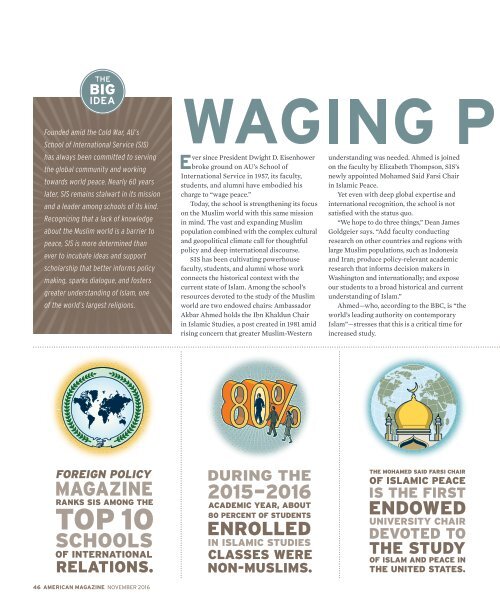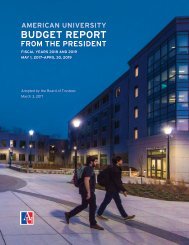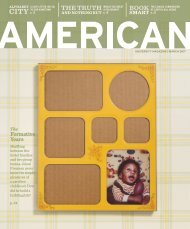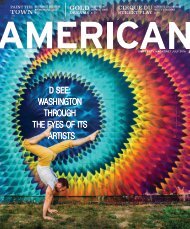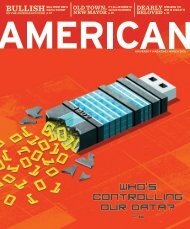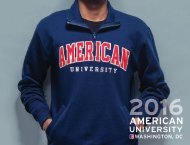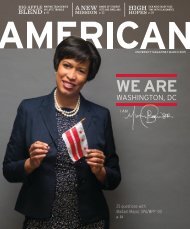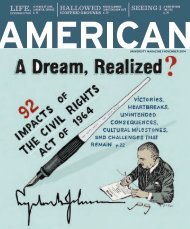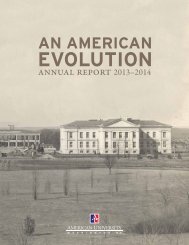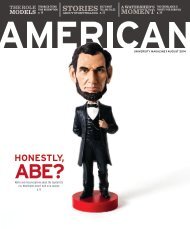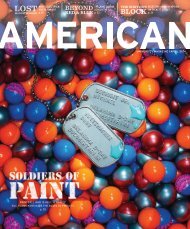American Magazine: November 2016
In this issue, delve into the Scandal-ous life of Judy Smith, meet ESPN’s new public editor, reflect on a decade of transformation under President Neil Kerwin, and learn more about autism—the fastest growing developmental disorder in the United States. Hop on the Metro to Capitol South and get to know a few of AU’s 1,068 Seattle transplants.
In this issue, delve into the Scandal-ous life of Judy Smith, meet ESPN’s new public editor, reflect on a decade of transformation under President Neil Kerwin, and learn more about autism—the fastest growing developmental disorder in the United States. Hop on the Metro to Capitol South and get to know a few of AU’s 1,068 Seattle transplants.
You also want an ePaper? Increase the reach of your titles
YUMPU automatically turns print PDFs into web optimized ePapers that Google loves.
Founded amid the Cold War, AU’s<br />
School of International Service (SIS)<br />
has always been committed to serving<br />
the global community and working<br />
towards world peace. Nearly 60 years<br />
later, SIS remains stalwart in its mission<br />
and a leader among schools of its kind.<br />
Recognizing that a lack of knowledge<br />
about the Muslim world is a barrier to<br />
peace, SIS is more determined than<br />
ever to incubate ideas and support<br />
scholarship that better informs policy<br />
making, sparks dialogue, and fosters<br />
greater understanding of Islam, one<br />
of the world’s largest religions.<br />
Ever since President Dwight D. Eisenhower<br />
broke ground on AU’s School of<br />
International Service in 1957, its faculty,<br />
students, and alumni have embodied his<br />
charge to “wage peace.”<br />
Today, the school is strengthening its focus<br />
on the Muslim world with this same mission<br />
in mind. The vast and expanding Muslim<br />
population combined with the complex cultural<br />
and geopolitical climate call for thoughtful<br />
policy and deep international discourse.<br />
SIS has been cultivating powerhouse<br />
faculty, students, and alumni whose work<br />
connects the historical context with the<br />
current state of Islam. Among the school’s<br />
resources devoted to the study of the Muslim<br />
world are two endowed chairs: Ambassador<br />
Akbar Ahmed holds the Ibn Khaldun Chair<br />
in Islamic Studies, a post created in 1981 amid<br />
rising concern that greater Muslim-Western<br />
understanding was needed. Ahmed is joined<br />
on the faculty by Elizabeth Thompson, SIS’s<br />
newly appointed Mohamed Said Farsi Chair<br />
in Islamic Peace.<br />
Yet even with deep global expertise and<br />
international recognition, the school is not<br />
satisfied with the status quo.<br />
“We hope to do three things,” Dean James<br />
Goldgeier says. “Add faculty conducting<br />
research on other countries and regions with<br />
large Muslim populations, such as Indonesia<br />
and Iran; produce policy-relevant academic<br />
research that informs decision makers in<br />
Washington and internationally; and expose<br />
our students to a broad historical and current<br />
understanding of Islam.”<br />
Ahmed—who, according to the BBC, is “the<br />
world’s leading authority on contemporary<br />
Islam”—stresses that this is a critical time for<br />
increased study.<br />
46 AMERICAN MAGAZINE NOVEMBER <strong>2016</strong>


